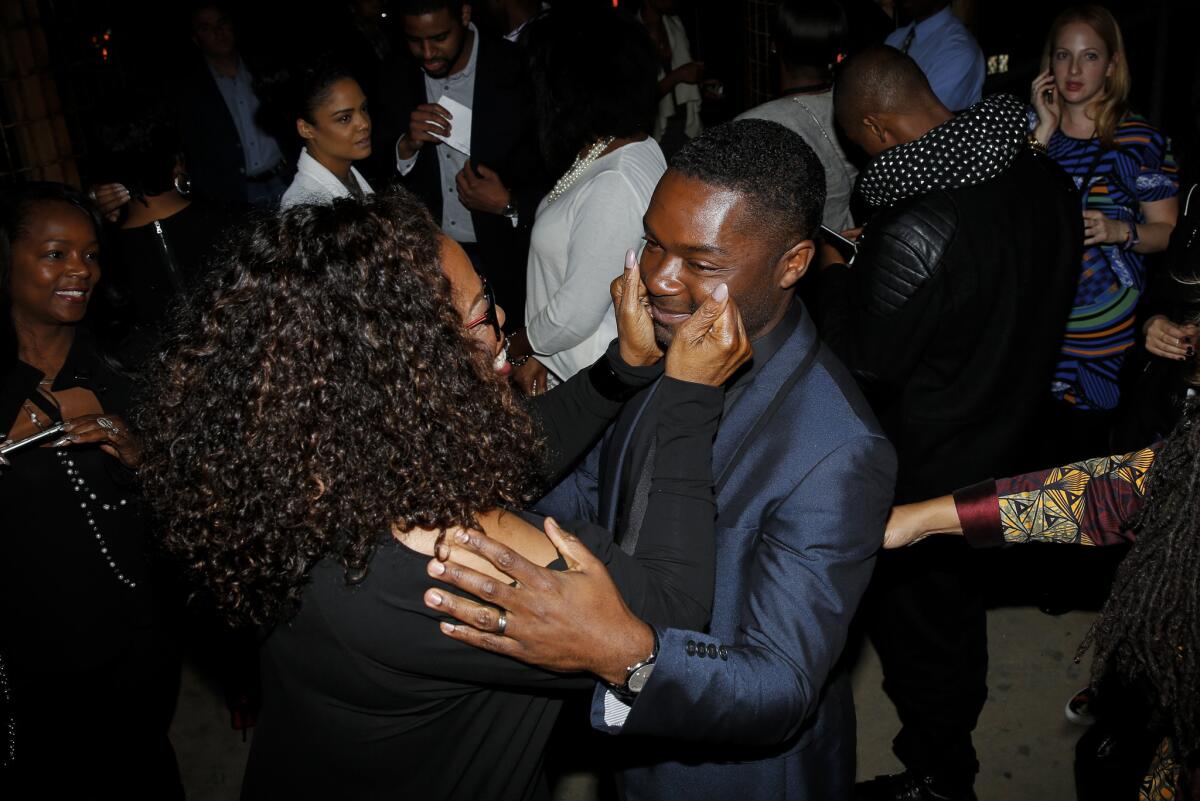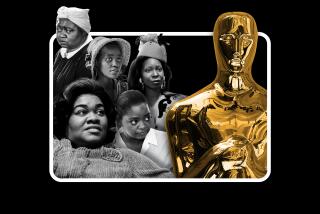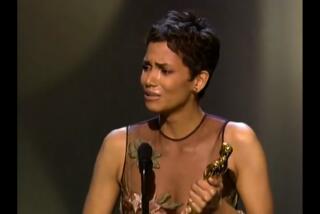Fickle social media can boost, or trip up, Oscar hopefuls in an instant

The lights hadn’t even come up yet after Tuesday night’s AFI Fest premiere of “Selma” when the tweets started rolling out from the Egyptian Theater, virtually all of them praising Ava DuVernay’s Martin Luther King biopic and the performance of its star, David Oyelowo, in sound bites that would be the stuff of any publicist’s dreams: “A triumph.” “Powerhouse.” “One of the greatest performances you’ll ever see.” “Oscar contender across the board. Typing thru tears.”
In a matter of minutes, a handful of tweets from a single screening of a movie that won’t hit theaters until Christmas had transformed this year’s Academy Awards race, providing the latest illustration of the way in which one of Hollywood’s oldest and most important rituals — the annual Oscar campaign — has been upended by what is still a fairly new phenomenon: social media.
For the behind-the-scenes strategists enlisted to run Oscar campaigns, managing the media narrative around a particular film or performance and persuading academy members to cast their votes one way or another has never been an easy task. In the age of social media, though, with film writers racing to deliver instantaneous reactions to a new movie even before they’ve left their seats and the most extreme opinions often grabbing the most attention, it’s become vastly more complicated.
In an Oscar season widely regarded as relatively weak, several highly anticipated films — including “Men, Women & Children,” “Fury” and “Interstellar” — have seen their Oscar hopes lifted and then either dashed or diminished by reactions on social media, sometimes before the film has even been reviewed by major critics or hit the local multiplex. Others — including “Boyhood,” “Birdman” and now “Selma” — have been buoyed by rapturous enthusiasm on Twitter and Facebook.
With Oscar prognosticating increasingly treated like a bloodsport, one in which an initial rush of sometimes-overinflated acclaim can be quickly followed by an equally outsized backlash, the Internet’s unruly din can throw a carefully planned awards strategy off course in an instant.
“It’s like an echo chamber of a kind of blather,” said Terry Press, president of CBS Films and a veteran strategist behind Oscar pushes for films that included “American Beauty,” “Gladiator,” and “Inside Llewyn Davis.” “It’s comments pinging off each other. You can declare, ‘This is a masterpiece,’ and then somebody two minutes later, just to get traffic, will tear you down and say, ‘This is by no means a masterpiece.’ It feeds off itself.”
The power of that echo chamber can cut both ways, as evidenced perhaps most vividly by the fluctuating fortunes of “Interstellar.” Months before this year’s awards season kicked into gear, the Oscar prospects for Christopher Nolan’s sci-fi epic already seemed all but written in the stars. Sight unseen, many Oscar watchers pegged it as a likely best picture nominee, if not the film to beat.
In the long run-up to the movie’s release last week, Paramount Pictures unrolled a carefully orchestrated publicity campaign designed to bolster that perception, cultivating an air of importance and landing its director and stars on the cover of Time magazine.
Then seemingly overnight, just as “Interstellar” was finally poised to hit theaters, its awards odds appeared to go, by general consensus, from a slam-dunk to a question mark. The reason? Fairly or not, based on a few early screenings, the same Twittersphere that had helped amplify the hype around the movie suddenly changed its tune.
“BIG HERO 6 and INTERSTELLAR open this week as different SF [sci-fi] films,” one film writer, James Rocchi, tweeted to his 11,000 followers. “One is made explicitly for children & the other is animated, from Disney.”
In decades past, the Oscar consultants hired by the studios to promote their films during awards season could slowly and deliberately build a campaign over time through festival screenings, academy events, advertising and press appearances by a film’s talent. Those methods for spreading the word are still critically important but, as with political campaigning, the Internet has sped up the metabolism of the Oscar race exponentially.
With social media bringing an untold number of new armchair critics into the conversation and giving each his or her own megaphone, if a film isn’t deemed up to Oscar snuff, a single poorly received screening can quickly torpedo its awards hopes.
Such was the case with Jason Reitman’s drama “Men, Women & Children,” which was met with a wave of negative reactions on social media following its Sept. 6 debut at the Toronto Film Festival and went on to gross less than a million dollars at the box office.
“Once, taking a film to Toronto in early September meant just a few hundred people talked about it, and you could let that resulting conversation and publicity seep through the stratosphere for a few months,” said longtime Oscar consultant Tony Angellotti, who is steering the Oscar campaign for the upcoming World War II epic “Unbroken.” “You could bank stories, hold news, embargo reviews. Now everyone is aware what’s happened in Toronto before the filmmakers’ flights have hit the tarmac.
“Everything and anything goes into the echo chamber, and you can’t really do that much with it because social media has dictated that course for you,” he added. “The noise is profound — and profoundly stupid in some cases.”
Stupid or otherwise, the noise can help as much as it hurts. Positive early reactions on social media to Richard Linklater’s coming-of-age film “Boyhood” eventually drove the film to nearly $24 million at the box office; it’s considered to have a lock on a best picture nomination.
On the other hand, Paul Thomas Anderson’s gonzo Thomas Pynchon adaptation “Inherent Vice,” which opens Dec. 12, generated tremendous excitement online early on. After its first two-minute trailer debuted, Slate breathlessly declared that the film “looks like a comic masterpiece.” Now that the film has actually been seen, the reactions have been more mixed.
The Oscars are about more than prestige and self-congratulation. An Academy Award nomination can often translate into a significant bump in a film’s grosses, particularly for the type of adult-oriented fare that can otherwise face long box-office odds. 2012’s “Silver Linings Playbook” earned an additional $71 million after it received a best picture nod, though post-nomination bumps are generally smaller.
Given those stakes, to the extent they can, Oscar strategists, like studio marketers, need to use tools like Facebook and Twitter proactively, said Marc Karzen, chief executive of RelishMIX, a company that consults on social media strategy for movies and TV shows.
“If things are going well at festivals or otherwise, you want to fan the flames and build the momentum as much as you possibly can,” Karzen said. Once the buzz around a film sours, he noted, options become far more limited. “It’s not like you’re going to go back and recut the movie.”
Ultimately, of course, when it comes to the Oscars, the only opinions that truly matter belong to the 6,000 or so voting members of the Academy of Motion Picture Arts and Sciences.
That very specific audience differs significantly from that of filmdom’s Twitterati, notes Cynthia Swartz of Strategy PR/Consulting who is overseeing the Oscar campaigns for “Boyhood” and “Inherent Vice” as well as “Birdman,” “Wild” and other films.
Academy members, by and large, represent an older demographic (the median age is 62, according to a 2012 Times analysis) that tends to be far less active on social media than the pundits who track the Oscars for a living.
“I don’t think many academy members are looking at Twitter so much that it would actually influence their votes,” Swartz said. “I think it’s possible that all of this [noise on social media] has a lot more impact on people who cover the Oscars than it does on actual Oscar voters.”
CBS Films’ Press, however, counters that, although many Oscar voters may not be posting their own preferences on Facebook and Twitter, they nevertheless can’t help but pick up on the digital gyrations of buzz secondhand. When actors are making the rounds on the morning and late-night chat shows, she noted, references are inevitably made to any awards heat surrounding their performance.
“It’s not about academy member to academy member. It’s about how the media takes all this noise as some sign of reality,” Press said.
With months of campaigning still to go and a number of major films yet to open, this year’s Oscar race is still very much in flux, and there’s plenty of time for the various horses on the track — “Selma” and “Interstellar” included — to shift positions before the nominations are announced Jan. 15.
For an Oscar strategist trying to navigate the roiling digital waters, Press said, it ultimately comes down to this: “There’s only one goal, and that is to get people to watch the movie. That’s it. Because once they’ve seen the movie, they make up their own minds. If people love a movie, they love it no matter what the Twittersphere says.”
More to Read
Only good movies
Get the Indie Focus newsletter, Mark Olsen's weekly guide to the world of cinema.
You may occasionally receive promotional content from the Los Angeles Times.







